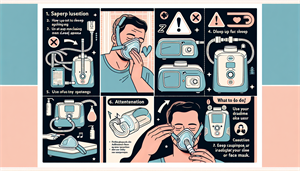
Understanding Sleep Apnea and Its Natural Solutions
Sleep apnea chiefly manifests in two primary classifications; obstructive sleep apnea (OSA) and central sleep apnea (CSA). OSA, also known as obstructive sleep apnea syndrome, arises from involuntary muscle relaxation that obstructs the airways, whereas CSA stems from inadequate signaling from the brain to the breathing control muscles. The typical factors contributing to sleep apnea span the dimensions of the throat or jaw, weight, age, and gender.
Symptoms commonly include pronounced snoring, disturbed sleep, and daytime drowsiness. Continual loud snoring, excessive daytime sleepiness, morning headaches, or observed pauses in breathing during sleep should prompt a medical consultation.
These symptoms could signal sleep apnea, warranting medical guidance before trying any home remedies. Despite the need for medical consultation, natural solutions can aid in managing sleep apnea symptoms within a home environment.
Lifestyle modifications, changes in sleep position, and weight loss can lead to significant improvements. Nonetheless, if the symptoms persist despite these remedies, it becomes necessary to seek medical intervention.
The Role of Lifestyle in Treating Sleep Apnea Naturally
Lifestyle changes are pivotal in controlling sleep apnea symptoms. From maintaining a healthy weight to practicing good sleep hygiene and avoiding harmful substances, simple changes in your day-to-day routine can offer significant relief.
Embracing a Healthy Weight
Attaining and maintaining a healthy weight can significantly reduce the risk of sleep apnea and alleviate its symptoms. Weight management assists in alleviating this condition and suppressing sleep apnea symptoms by reducing airway pressure.
There is a robust correlation between obesity and sleep apnea. Excess body weight, particularly fat accumulation in the upper respiratory tract, can lead to airway constriction. This constriction triggers airway collapse during sleep, thereby causing sleep apnea. Obesity significantly raises the likelihood of developing sleep apnea and makes it more challenging to treat.
Prioritizing Sleep Hygiene
Adopting good sleep hygiene is crucial for the control of sleep apnea. It aids in establishing a healthy sleep pattern and optimizing the sleep environment, thereby improving sleep quality and reducing sleep apnea symptoms.
A comfortable sleep environment involves ensuring the room is dark, quiet, and at a comfortable temperature. A consistent sleep schedule preserves the body’s internal clock and facilitates deeper, more rejuvenating sleep. Additionally, it aids in aligning hormonal and metabolic regulations, which may otherwise be disrupted in individuals with sleep apnea.
Avoiding Harmful Substances
Certain substances can exacerbate sleep apnea symptoms. Excessive alcohol consumption can relax the muscles in the throat, leading to airway obstruction and worsening sleep apnea. Similarly, smoking can cause inflammation and fluid retention in the airway, further contributing to sleep apnea symptoms. Avoiding these harmful substances can significantly improve sleep apnea symptoms and overall health.


